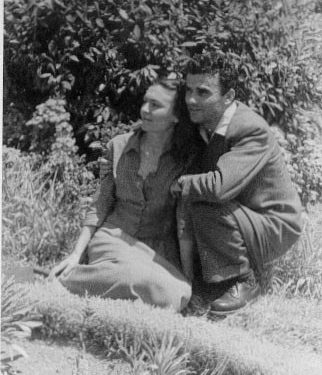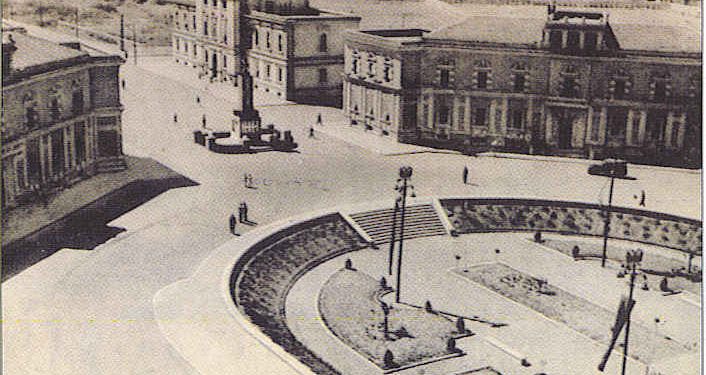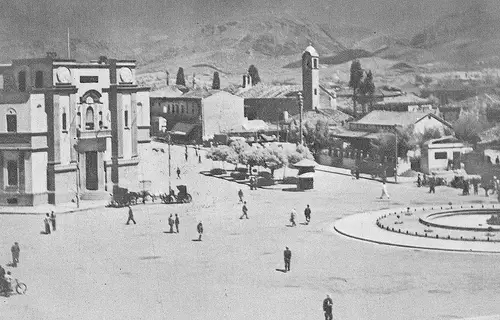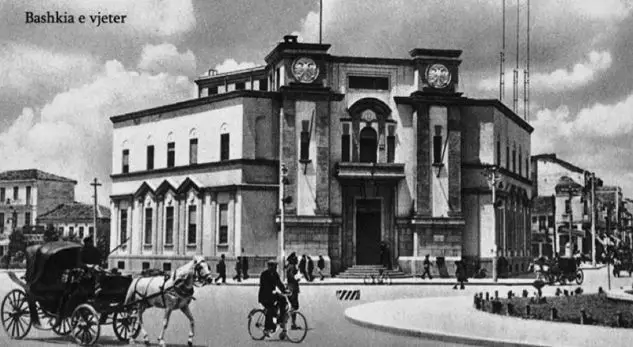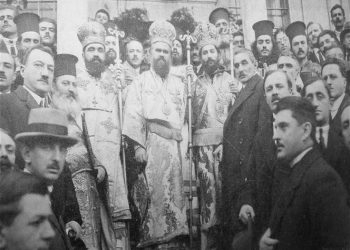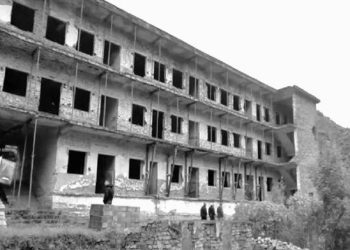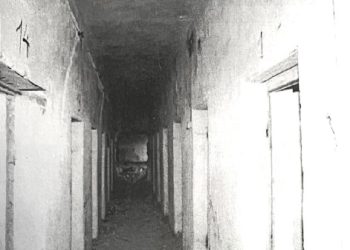Memorie.al publishes the unknown history of the establishment of the Agricultural Bank of the Albanian State in the years of the Zog Monarchy. How was it created, who were the Italian specialists who provided the technical assistance and directed it, what criteria did the Albanian farmer have to meet to withdraw the loan, the interest he had to pay for its repayment and the penalties provided by the law for loan abusers !? Until 1937, when the Agricultural Bank of the Albanian State was established, in our country there were: the National Bank of Albania, the Bank of Naples, the Bank of Rome, the Italian-Albanian Bank, the Bank of Athens and the Bank of Belgrade, which had opened branches in them in Tirana, Durres and two or three other cities in the country. Regarding this, it is known in the following article, which was published in the magazine ” National Economy ” of 1937, where the well-known journalist, Petro Marko, had a long conversation with the then Minister of National Economy, Terenc Toçi and the director of the Agricultural Bank, the Italian, Cav. Frigione.
Given some development that Albanian agriculture received in the last years of the Zog Monarchy, it was deemed necessary, even necessary, the opening of an Agricultural Bank, which in addition to providing assistance to the farmer of the Albanian peasant, will to enable the further development of agriculture in our country, in all its aspects. Until 1937, when the Agricultural Bank of the Albanian State was established, the following banks existed in our country: the National Bank of Albania, the Bank of Naples, the Bank of Rome, the Italian-Albanian Bank, the Bank of Athens and the Bank of Belgrade, which had opened their branches in Tirana, Durrës and two or three other cities of our country. The opening of these banks at that time, most of which were with Italian capital, gave a great impetus to the development of the Albanian national economy, and of course the improvement of the living of Albanian citizens. This prompted the opening of the Agricultural Bank on July 1, 1937. How did the creation of that bank become possible, who were the Italian specialists who provided technical assistance and directed it, what criteria should the farmer and peasant meet? Albanian to get the loan, and what penalties did the law of that time provide for those borrowers who abused the loan given by the bank?
Regarding these, it is known in the following article, which was published in the magazine ” National Economy “, of 1937, where the well-known journalist, Petro Marko, had a long conversation with the then Minister of National Economy, Terenc Toçi and the director of the Agricultural Bank, the Italian, Cav. Frigione. We are publishing the article with abbreviations and sticking strictly to the original in the literary language of that time.
Article of the magazine ‘National Economy’: “Agricultural Bank opened”
During the month of July for the whole world and the Albanian press, the issue of the day was the opening of the Agricultural Bank, an old project that was transformed into a dream and that was finally realized. For the national press, the opening of the Agricultural Bank was the main topic that was beaten and developed with numerous and different articles from all those who are interested in improving the basis of the country’s economy, which is agriculture and livestock. On this occasion, the Albanian press did not hesitate to present to the public his opinion that he has been assigned to be directly interested in the realization and implementation of the great leader of Albania. Thus, the two notebooks of the capital, one after the other, were rushed, received and published special interviews by the head of the Ministry of National Economy. For chronic and historical reasons, even in this only Albanian Agricultural Magazine, something should be written about the Agricultural Bank that is the dynamo or the spirit of agriculture and livestock. But did the two notebooks of the Capital, the four of the provinces and the other temporary ones, leave nothing unsaid about the need and importance of the Agricultural Bank? You say no. Therefore, this magazine that is published for those who should benefit from the Agricultural Bank, in accordance with the practical program assigned to achieve the best goal in this case, is leaving the word back to the press. Here is what the “Press” notebook says:
Bank organizers
We ask the Minister of National Economy, Mr. Terenc Toçi, -Why did you call a foreign organizer? There was no good Albanian? – We do not have bankers, and more bankers specialized in Banking-Agricultural operations. Then I saw the need — of course with the right likes, to get a foreign organizer to come to us, in the spirit of friendship. And Banco di Napoli through His E. Mr. Frigani, general manager, sent me here Mr. Cav. Francesco Frigoni, who was the director of the agrarian branch for Banco di Napoli. – Well, under what conditions did Mr. Cav come here? Frigion? -It should be known that Banco di Napoli is derived from charity and has no shareholders. And therefore, he is free to make some generous gestures, as he did with us by sending Mr. Frigion at the expense of Banco. He also had the honor to send us as assistant director Mr. Luigi Pepe, also this very lively man with a high moral and scientific value. Mr. Cav’s first care. The frigate has been this: to adopt the law and regulation according to the situation and circumstances of our country, to treasure the experience of done in areas of southern Italy, which more or less resemble our country.
Who will get the money?
The Bank of Agriculture is opened by law and a regulation that on the one hand provide humane and patriotic support to the agricultural people, and on the other hand protection from all those who still do not deserve this support. And those who act conscientiously and faithfully will improve without the profits from the Bank. Here we are, we have returned to the beginning of our conversation – says Mr. Toçi, thinking. The right one, we can have big ladies. So, the bank money will be taken and used by the one who deserves it, i.e. one who consciously receives and uses them for the benefit of himself and the National Economy. The need to make such a serious and balanced preparation for a new Bank with many obstacles, arises the delay of opening. The failure of the State Agricultural Bank – God forbid – (adds Mr. Toçi in a touching tone) would have been a moral ruin for our people.
About the Bank’s activity
-How do the actions start? These start with short, medium and long term, although long term operations, for the first five years we have limited them to small amounts that can never exceed 1000 gold francs. – But why so? – We want to walk slowly and safely. While Mr. Toçi, despite his heart, spoke nicely explaining the activity of the Bank, fortunately Mr. enters the office. Cav Frigioni, director of the Bank we were talking about. His Excellency is generously received by the Minister and participates in our assembly. After his excellence explains our purpose, he is very pleased and asks permission to speak with the Albanian farmer.
What should farmers do …?!
And then we turn to Mr. Frigioni: -Don’t tell me, sir, what do farmers have to do to have an agrarian loan? First of all, the farmer must make a request to the Bank Directorate in Tirana, directed directly or through the Mayor, asking for the purpose for which the loan is requested. (The purpose must be clear: either for seed or for chemical fertilizers, for other tools). However, when a farmer wants to get a loan from the Bank, he will present the right guarantees. And what are the guarantees that are necessary for withdrawing money? – Loans are guaranteed by a special privilege in the collection of products, determined by laws with a guarantee for the amount given by the bank and then with a guarantee signature that can be given by the owner of the fund, – if this is a tenant-or signature of a person who can pay the bank, in case the farmer will not be able to pay himself. – What is this privilege? It is a property right determined by law on harvest. It is at the forefront of all the privileges granted by other laws, with the exception of state law, to court costs. – Well, it’s a mess here! How can the father-in-law know that there is such a privilege of the Agricultural Bank? – Anyone can easily find out. To run without fear in each municipality, which will keep special books for descriptions of privileges (facilities, our note).
Foreign bank and farmer
-What are the other actions of the farmer? -The loans that he will ask for can also be for the purchase of livestock and not for the increase of livestock, but for the auxiliary needs of the increase of the land, such as etc. For the purchase of agricultural machinery, for the purchase of various tools, for the planting of plants, – such as olives, vineyards, various trees – and these are not for large quantities. -How long are these loans given? These are given for five years. And one-fifth will be paid for each year. – What are the guarantees for these loans? – First of all, the privilege for the goods that are bought with the money of the Bank and then on the collections. – Are loans given for the improvement of agricultural land? The law provides that even these loans: repair of houses for farmers, repair of wells and stables, steam, fences, canals for drinking water and irrigation, for land improvements: alleys in properties and between properties, purchase of small plots of land for small families. These actions must be limited to 1000 francs during the first five years. After this period, loans will be added. -How long are these paid and for how long are they given? Such a loan can be given for another 30 years according to the importance of the production it can give you, i.e. according to the reasonable authorization that the work presents with the possibilities provided by the products. The guarantee consists of a special and privileged mortgage. In the first five years of the exercise, it will be the first mortgage, and after five years, even if it is the second or third mortgage, it still has the value of the first mortgage, of course for the actions that take place after the sixth year.
Interest and the state
-What is the interest rate of these loans of the Bank? – Interest will be set by the administrative council and will not exceed 6 or 7%, depending on the type of actions. There is also state aid for long-term loan repayments. – What is this state aid please? – Let’s say that the interest set by the administrative council is 7% and the state provides a 2% assistance. Then the farmer pays 5%. Excuse me another question: -What is the difference between an agricultural loan and a regular loan? – Ordinary loan is a home loan, while agricultural loan is given for the sole purpose of being used for agriculture.
Measures for offenders
-Well, what happens when a farmer wastes the money he borrows for other purposes, such as marriage, how do I know? In a word, what about those who lie to the Bank? -Here the law is strict. Pursuant to Article 22 of the Law, a borrower who uses in whole or in part the amount borrowed, for various purposes, and not for those for which the loan has been granted, or destroys or confiscates items found in the Bank’s privilege, shall be punished by severe imprisonment. , up to five years, according to Article 458, paragraph 2 of the Criminal Code. Finally, Mr. Cav. Frigione adds with an expression of pleasure. -I have good hopes and great faith in the honor and high character of the Albanian workshop. That is why I am sure that the great value of the wise working farmer will soon be revealed. Albanian. And we shake his hand wishing him steadfastness in the delicate mission entrusted to him. And leaving the work room, His Excellency Mr. Terenc Toçi, added the following: – For now only here in Tirana will be opened. A branch in the North of Albania and a branch in the South will be opened soon. Then there will be agencies in every corner of the Homeland. But this should be known by everyone: The Bank of Agriculture will extend its hand to the honest Albanian worker wherever he is. (P.M.) Memorie.al







